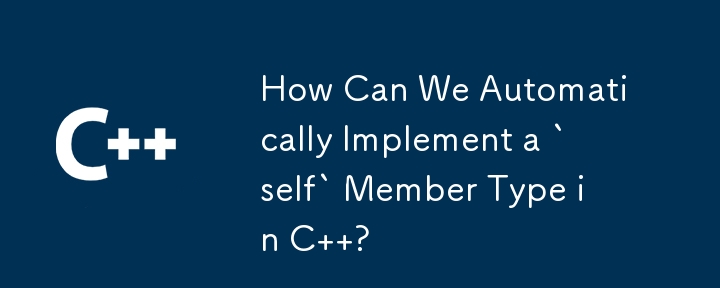Home >Backend Development >C++ >How Can We Automatically Implement a `self` Member Type in C ?
How Can We Automatically Implement a `self` Member Type in C ?
- Mary-Kate OlsenOriginal
- 2024-12-07 21:39:13505browse

Autonomous Implementation of self Member Type in C
C lacks an explicit syntax for the self keyword as found in PHP, which denotes the type of the enclosing class. Traditionally, this behavior can be emulated manually by defining a typedef alias within each class:
struct Foo
{
typedef Foo self;
};
However, this approach involves repeating the class name, introducing potential risks of mismatch and errors. To address this, an alternative method leveraging decltype and friends has been proposed:
struct Foo
{
typedef decltype(*this) self;
};
Unfortunately, this syntax is invalid in the context of class definitions.
To achieve an autonomous implementation of self, a more sophisticated approach is required. Utilizing template metaprogramming, we can define a class template Self that encapsulates the class behavior while eliminating the need for manual type replication:
template <typename...Ts>
class Self;
template <typename X, typename...Ts>
class Self<X,Ts...> : public Ts...
{
protected:
typedef X self;
};
To employ this mechanism, we introduce two macros:
#define WITH_SELF(X) X : public Self<X> #define WITH_SELF_DERIVED(X,...) X : public Self<X,__VA_ARGS__>
Using these macros, we can define classes with self member types:
class WITH_SELF(Foo)
{
void test()
{
self foo;
}
};
For derived classes, the WITH_SELF_DERIVED macro allows multiple inheritance:
class WITH_SELF_DERIVED(Bar,Foo)
{
/* ... */
};
This solution is compatible with both gcc 4.8 and clang 3.4, enabling autonomous implementation of the self member type in C without the need for explicit class name repetition.
The above is the detailed content of How Can We Automatically Implement a `self` Member Type in C ?. For more information, please follow other related articles on the PHP Chinese website!
Related articles
See more- C++ compilation error: A header file is referenced multiple times, how to solve it?
- C++ compilation error: wrong function parameters, how to fix it?
- C++ error: The constructor must be declared in the public area, how to deal with it?
- Process management and thread synchronization in C++
- How to deal with data splitting problems in C++ development

